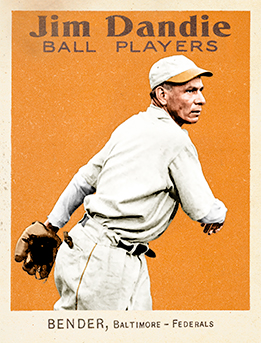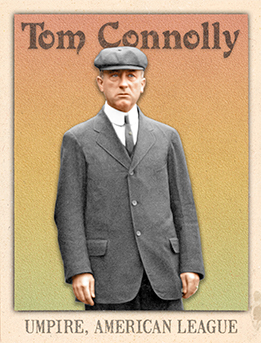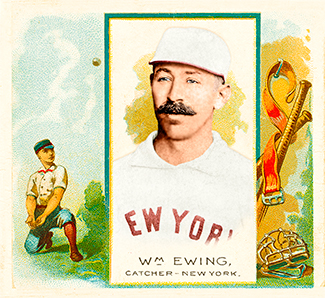
- Series: 1888 Champion New York Giants
- City: New York
- Team: Giants
- League: National League
- Hall: National Baseball Hall of Fame
William Ewing (1859-1906) was the premier catcher of the 19th century, honored for decades after his early death as even, perhaps, the greatest player of all time. A scourge at bat, Buck hit over .300 ten times. He played behind the plate with courage and style, crouching close to the hitter so as to shave precious seconds off his inerrant throws. Ewing had debuted with the remarkable Troy Trojans in 1880 and joined four future Hall-of-Famers in moving to NYC in ‘83. The sturdy catcher may have been the primary inspiration for Jim Mutrie’s “my Giants!” exclamation that led to the new identity of the Gothams. An arm injury on a raw spring day curtailed his tenure behind the plate from 1891 on. Such a magnetic figure couldn’t escape the turmoil of the Players’ League controversies and Ewing was sometimes pilloried for lax effort. Despite such caviling, Ewing left as indelible a mark on the game’s first century as anyone. Upon his induction to Cooperstown (among the first six of the “pre-modern” era), he was hailed by Connie Mack as the greatest catcher he had seen and he had seen most.
- “Buck” was a derivative of “Buckingham,” bestowed on the budding star by an admiring scribe who wanted to add gravitas to the youngster’s reputation
- Played all nine positions and managed 3 different teams over 7 seasons
- Was the first catcher elected to the Hall of Fame; and the second 19th century player elected (after Cap Anson)
- Elected to Hall of Fame: 1939
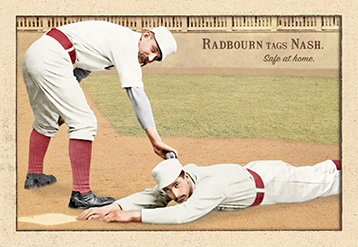
- Series: 1880s: Diamond Duos
- City: Boston
- Team: Beaneaters
- League: National League
- Hall: National Baseball Hall of Fame
Old Hoss Radbourn:
Charles Gardner Radbourn (1854-1897). An elite pitcher for 5 teams over 12 seasons, Radbourn owns the single-season Wins record with either 59 or 60 (sources vary) in 1884 – the year in which he became baseball’s 2nd triple Crown winner with 441 Ks & a 1.38 ERA. In 1884, Radbourn started 40 of his team’s last 43 games and won 36 of them. In the 1884 World Series, Radbourn started and won all three games, giving up only 3 runs. Including the postseason, Old Hoss won 62-63 games in 1884 and threw over 700 innings.
- NL Triple Crown: 1884
- NL Wins champ: 1883, 1884
- 309 career Wins
- Pitched no-hitter: 1883
- Elected to Hall of Fame: 1939
Billy Nash:
William Mitchell Nash (1865-1929) made one invaluable contribution to baseball: he scouted & recruited Napoleon Lajoie, bringing him to the Philadelphia Phillies in 1896. By that time, Nash had mostly played out his ML career as a steady-hitting 3rd baseman for the Boston Beaneaters. He compiled a respectable .275 lifetime average and, in 1895, was declared by Sporting Life magazine “the best fielding third baseman in the League.” Traded for future Hall of Famer Billy Hamilton to the Phillies, Nash was player-manager when he found Lajoie who was pounding the ball for the Fall River Indians in the New England League.
- Nash broke into the majors with his hometown Richmond Virginians of the old AA in 1884 before finding a home wih the NL Beaneaters
- Best year was 1887: .295 AVG with 84 RBI
- Bill James ranks Nash 49th amongst third basemen all-time
- Sporting Life touted his $7500 compensation in ’91 as money well-spent
Auction History
Cartophilia
Old Judge Pose: 377-2
- Series: Jim Dandie Feds
- City: Baltimore
- Team: Terrapins
- League: Federal League
- Hall: National Baseball Hall of Fame
Charles Albert Bender (1884-1954) won 212 games en route to a Hall of Fame career. He began life amid the abject poverty of a Minnesota reservation, was mentored by Pop Warner at the Carlisle Indian School and hit the majors with a bang for the Athletics in 1903. “Albert” as Connie Mack called him, beat future Hall members Cy Young and Clark Griffith compiling 17 wins in his rookie season. He led the league 3x in win percentage but was at his best under pressure. In 5 World Series, Bender won 6 games with a 2.44 ERA and completed 9 of his 10 starts.
- Connie Mack said that of all his players he would most trust Bender to win in the clutch
- Admired for his brilliance, Ty Cobb dubbed him the most intelligent pitcher he ever faced
- Elected to Hall of Fame: 1953
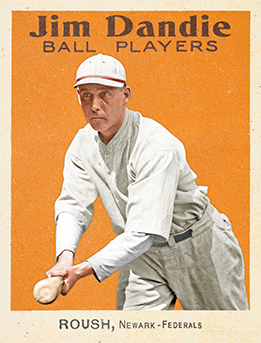
- Series: Jim Dandie Feds
- City: Newark
- Team: Peppers
- League: Federal League
- Hall: National Baseball Hall of Fame
Edd J. Roush (1893-1988) was an Indiana farm boy who knew his own mind. He built a Hall of Fame career on doing things his way. Spring training? Not for Edd, he stayed in shape. Use a bat heavier than any other player? Why not? His farm-bred arm strength allowed him to hit the ball wherever he chose with the weight of the bat doing most of the work. Stand still in the box awaiting the pitch? Not for Edd. He'd move his feet after the ball left the pitcher's hand, positioning himself according to his read. Endure management's miserly ways? No, Edd would hold out every year for a fairer contract. He'd skip to pirate leagues (the Federals) if necessary to find a better salary, something he had done as a school-boy player in Hoosier country and continued throughout his long and storied major league tenure. It took a few years in the bigs and a curious impatience by renowned manager John McGraw to get Edd to Cincinnati and the stage on which he would set records. Twice he edged out Rogers Hornsby for batting titles. He led the Reds to the Series championship in 1919, only to have that accomplishment tarnished by scandal. There is little doubt he was right in asserting that his club was better than Chicago's and really won it fair and square. During his twelve years with the Reds, Roush's batting average was .331. He never struck out more than 25 times in a season. He was fast on the bases and a terror in center, regarded as perhaps the premier defender of the Dead Ball era with Tris Speaker the competition.
- McGraw sent young Edd from the Giants to Cincy in 1916 along with two other future Hall-of-Famers: Bill McKechnie and Christy Mathewson. Matty was tickled to get a manager position and Edd and Bill were thrilled to get out from under the tough taskmaster McGraw
- When Edd threw out the ball at the last game played at Crosley Field, Joe Morgan said Roush was “the best of us all.”
- Elected to Hall of Fame: 1962
- Series: Diamond Heads '15
- League: American League
- Hall: National Baseball Hall of Fame
Thomas Henry Connolly (1870-1961) was a young English immigrant who became so fascinated by the strange game of baseball that he resolved to learn as much as he could about it. He devoured the rule book, began umpiring in Massachusetts and was discovered by a big league ump. So began a half-century career ending with election to the Hall of Fame as one of the first two officials so honored (with Bill Klem).
- Found his niche in the American League, officiating its first game on April 24, 1901
- From 1931 to 1954 was AL supervisor of umpires, assuring integrity and consistency in the game he knew as well as any man
- Elected to Hall of Fame: 1953


